

View Constitution below, Download pdf, or Open pdf

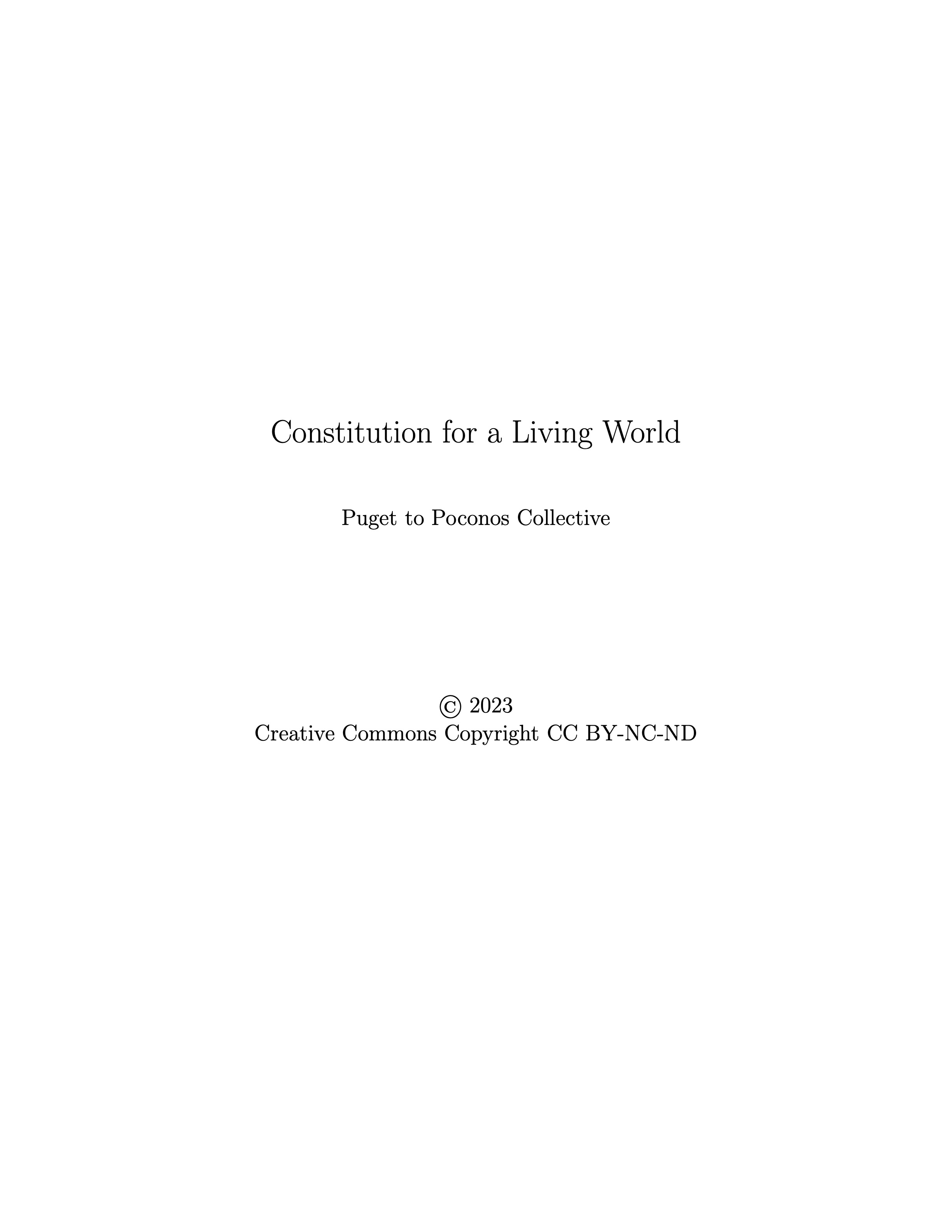
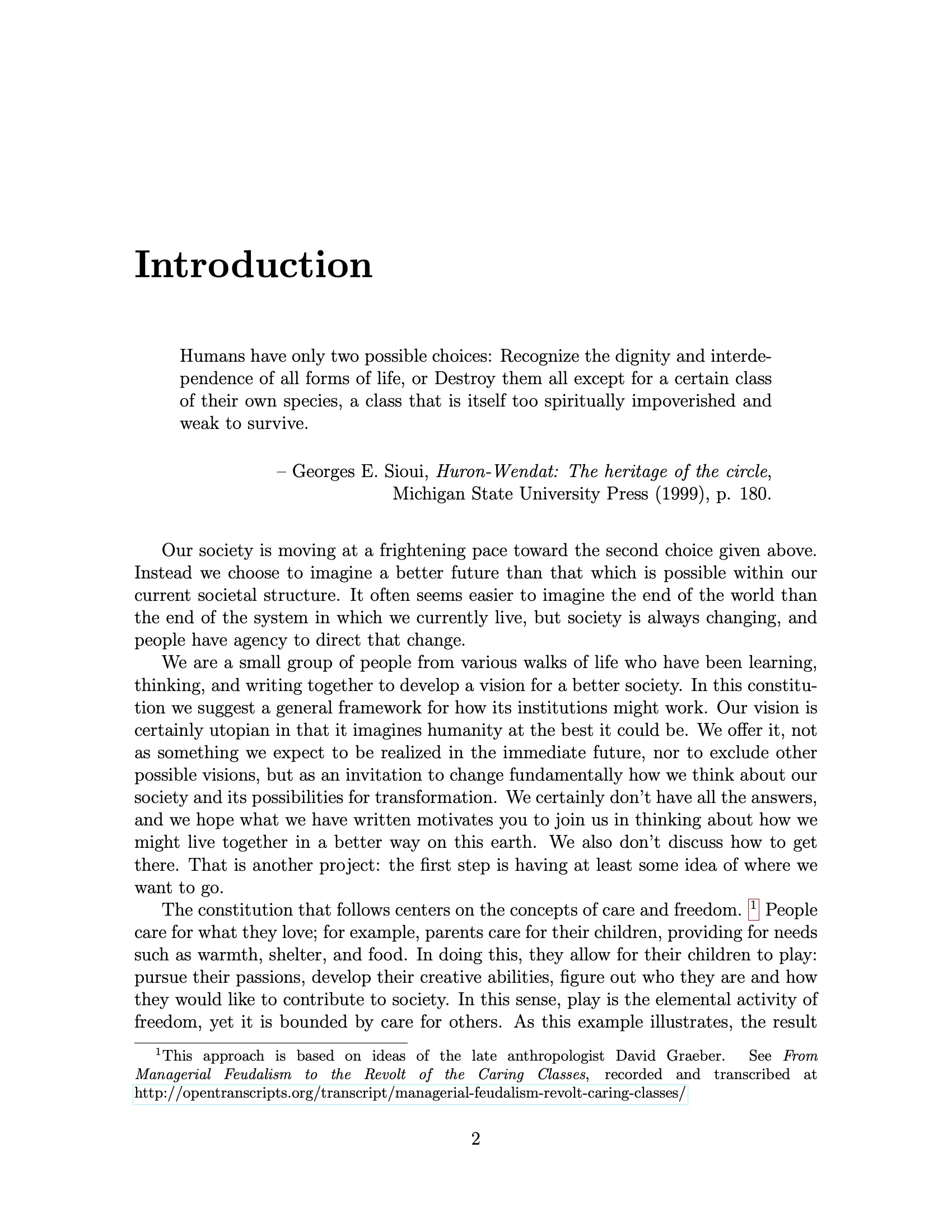


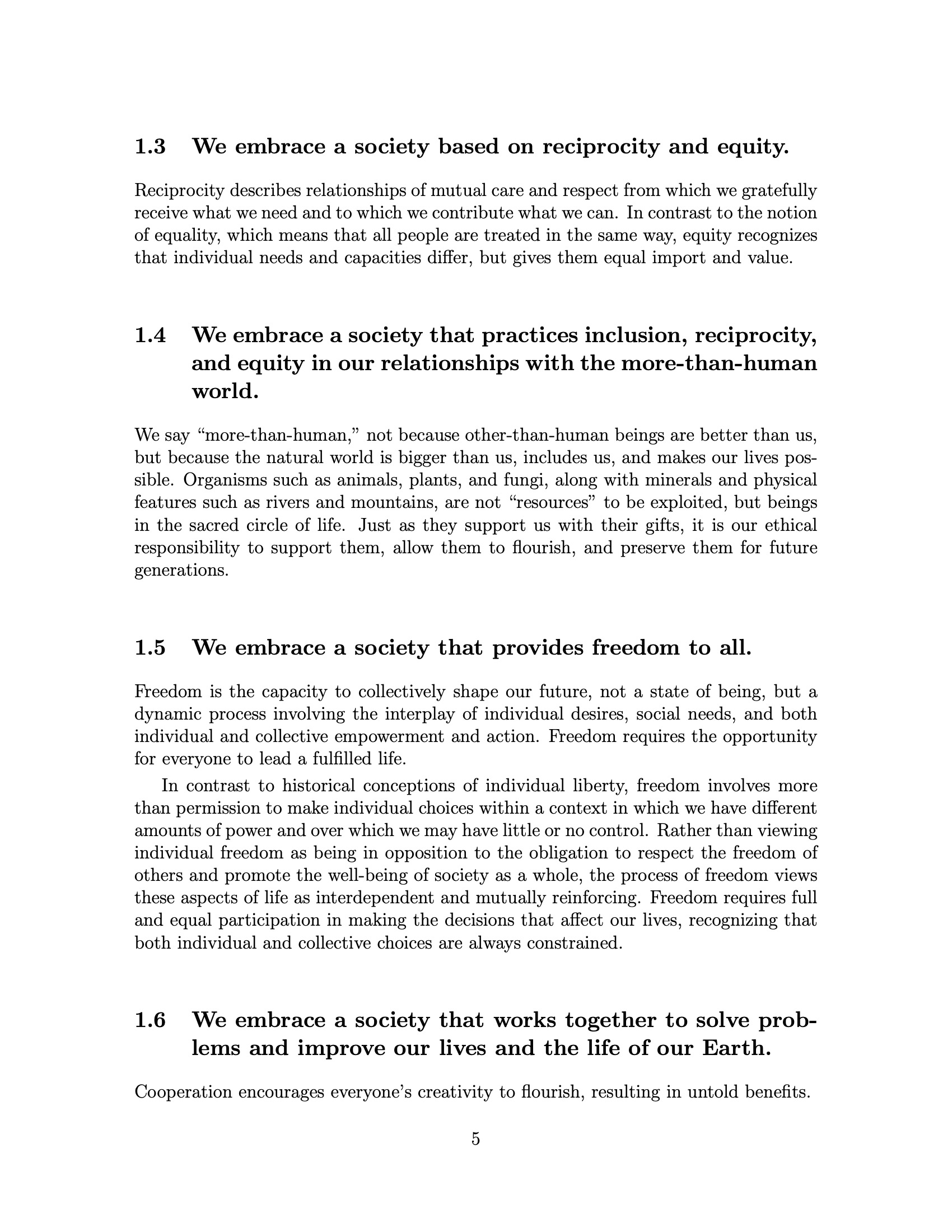
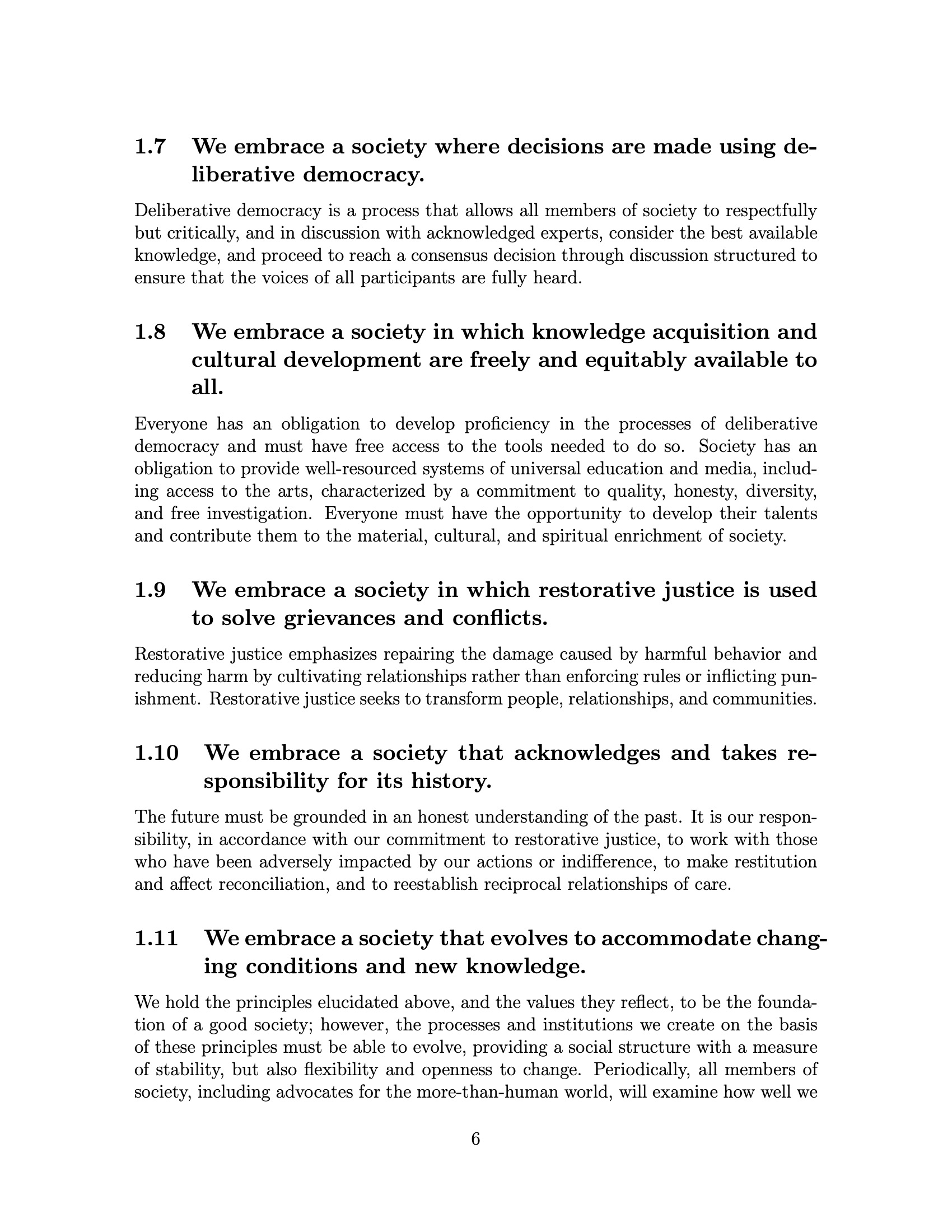





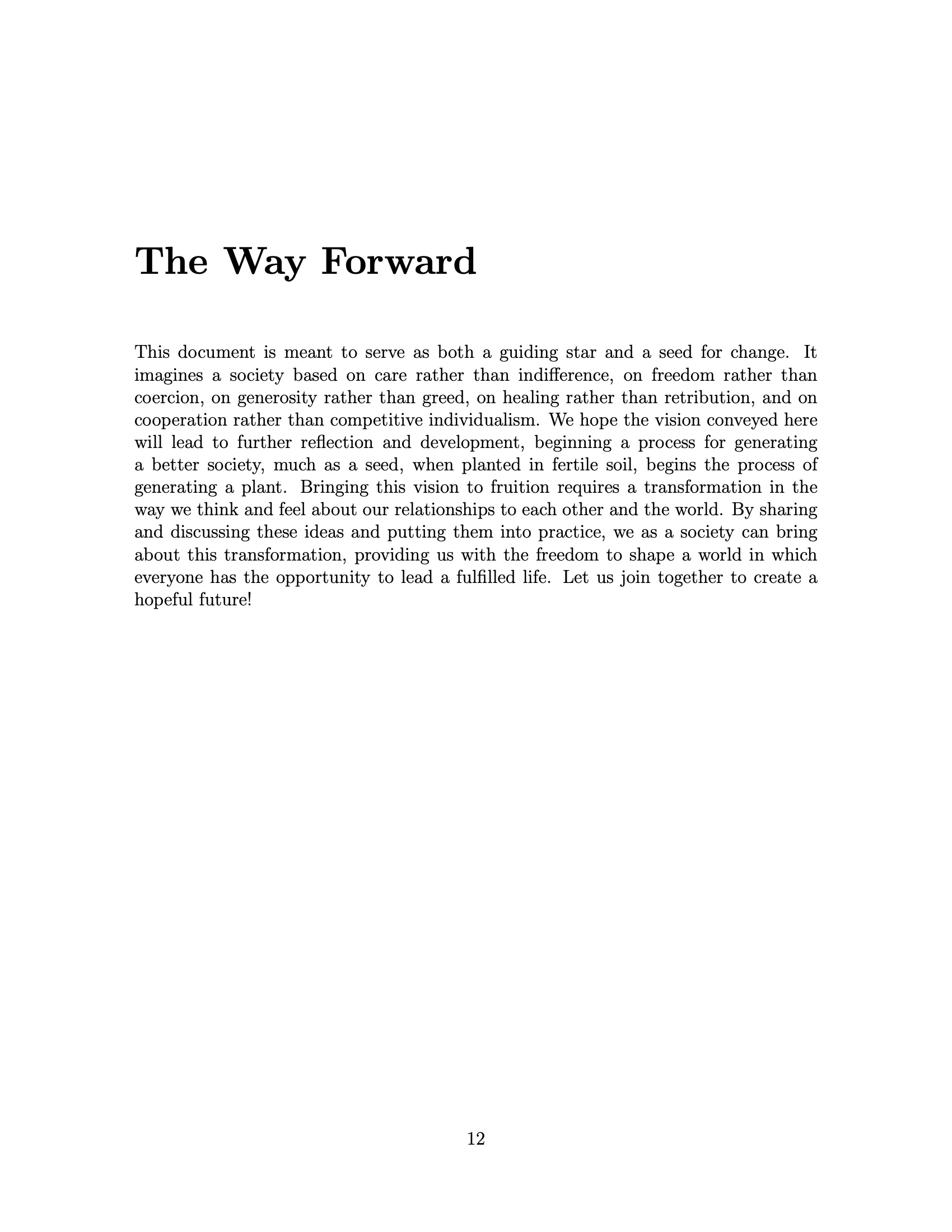
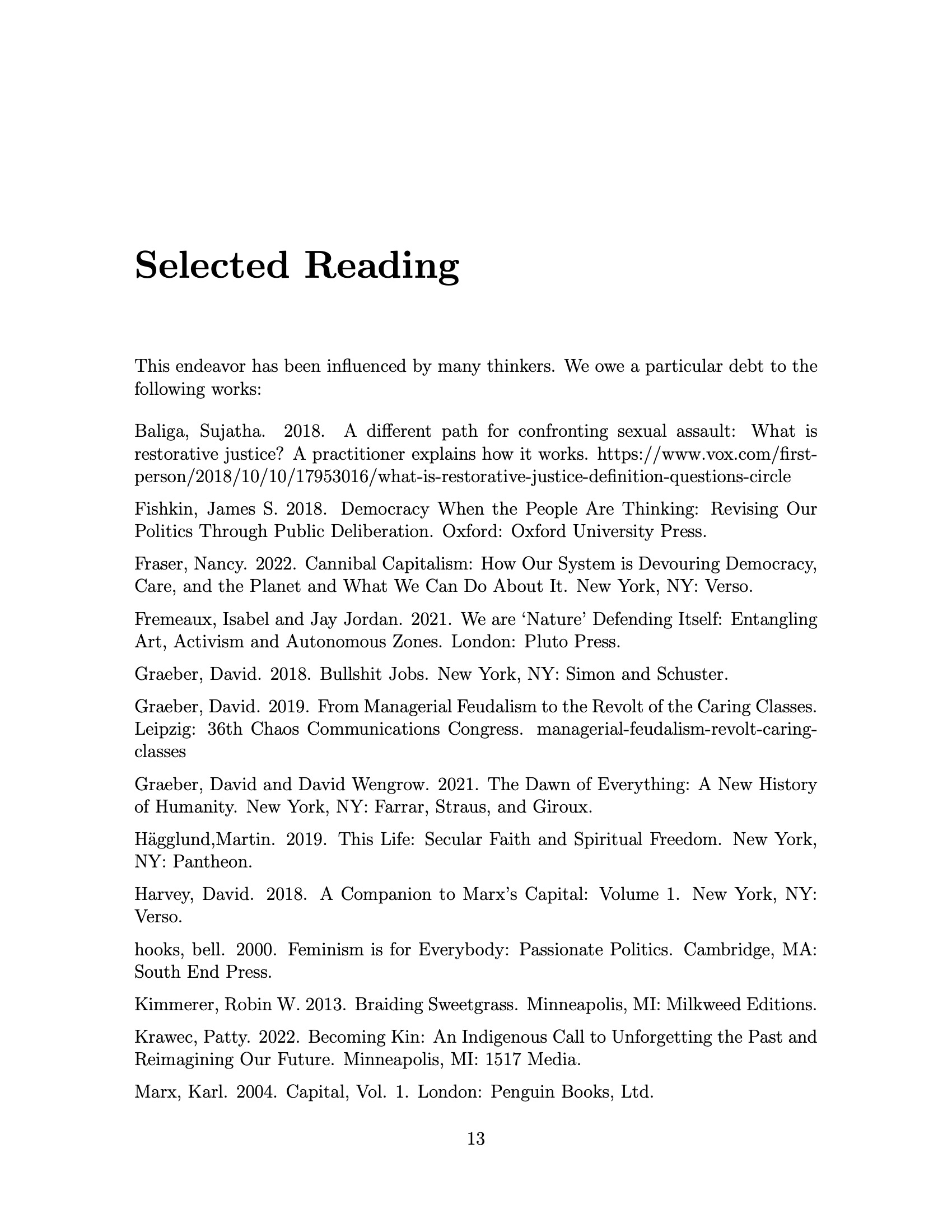
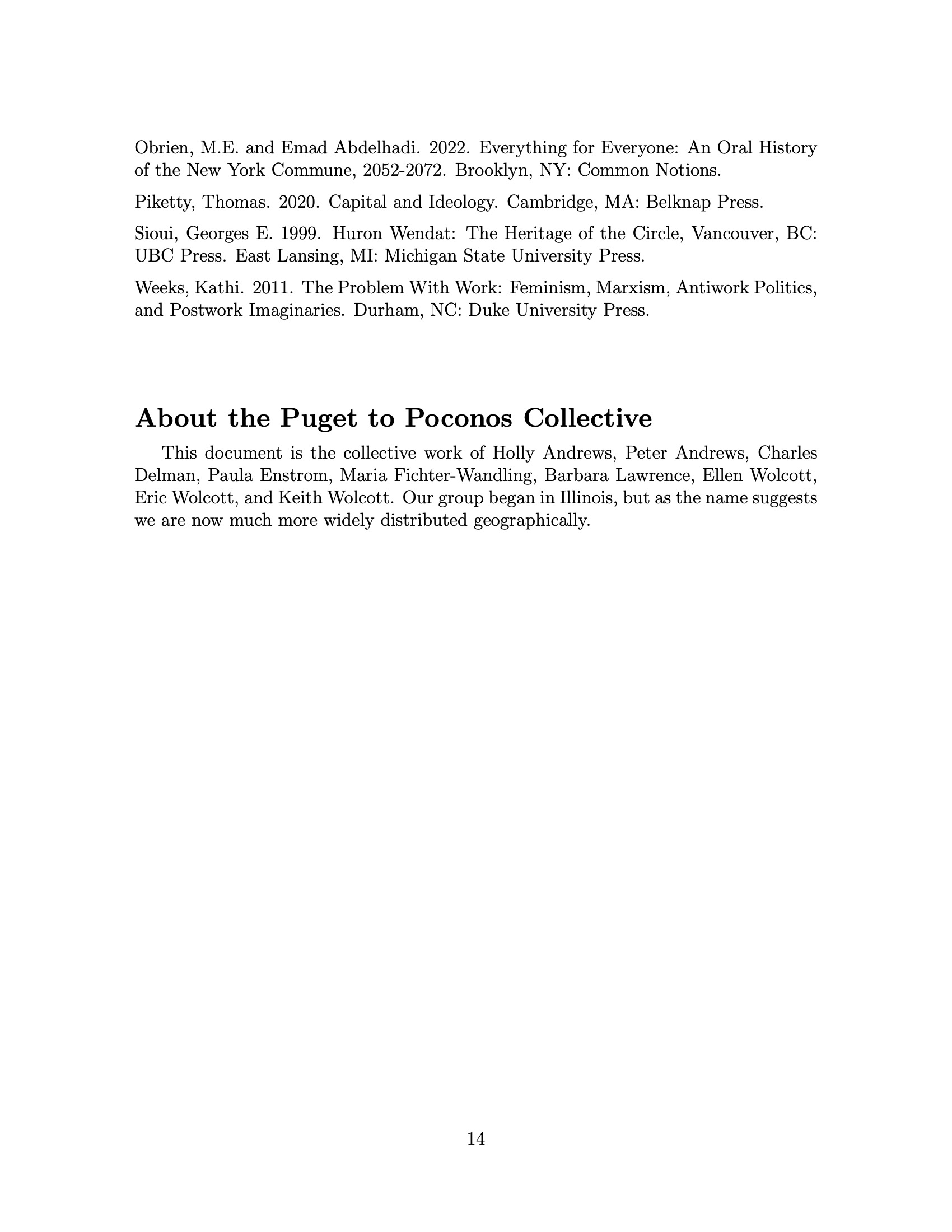
Constitution For a Living World
by the Puget to Poconos Collective
Creative Commons Copyright CC BY-NC-ND 2023
Humans have only two possible choices: Recognize the dignity and interdependence of all forms of life, or Destroy them all except for a certain class of their own species, a class that is itself too spiritually impoverished and weak to survive.
– Georges E. Sioui, Huron-Wendat: The heritage of the circle, Michigan State University Press (1999), p. 180.
Our society is moving at a frightening pace toward the second choice given above. Instead we choose to imagine a better future than that which is possible within our current societal structure. It often seems easier to imagine the end of the world than the end of the system in which we currently live, but society is always changing, and people have agency to direct that change.
We are a small group of people from various walks of life who have been learning, thinking, and writing together to develop a vision for a better society. In this constitution we suggest a general framework for how its institutions might work. Our vision is certainly utopian in that it imagines humanity at the best it could be. We offer it, not as something we expect to be realized in the immediate future, nor to exclude other possible visions, but as an invitation to change fundamentally how we think about our society and its possibilities for transformation. We certainly don’t have all the answers, and we hope what we have written motivates you to join us in thinking about how we might live together in a better way on this earth. We also don’t discuss how to get there. That is another project: the first step is having at least some idea of where we want to go.
The constitution that follows centers on the concepts of care and freedom [1]. People care for what they love; for example, parents care for their children, providing for needs such as warmth, shelter, and food. In doing this, they allow for their children to play: pursue their passions, develop their creative abilities, figure out who they are and how they would like to contribute to society. In this sense, play is the elemental activity of freedom, yet it is bounded by care for others. As this example illustrates, the result of care is freedom, and freedom requires care. Care and freedom are the fundamental needs, not just of humans, but of all the beings of the world.
The society we envision is an ecological one, based on the cultivation of our love for all beings. In a deep sense, this is love for ourselves: we are part of nature, and nature is part of us. Our conception draws heavily on the wisdom of indigenous peoples living in harmony with their habitats and on spiritual traditions that see humans as part of nature, rather than as transcendent and separate. By embracing our unity with the natural world, we will enhance the resilience, richness, and diversity of life, more equitably and effectively nurture everyone’s well-being, and live freer, happier lives.
Our conception also draws on a critical understanding of the society in which we live and its ills, including: hierarchies of dominance based on class, gender, race, ethnicity, and imperial subjugation; exploitation and expropriation of the majority for the enrichment and empowerment of a privileged minority; militarism, policing, punishment, and violence; the stifling of democracy; the ravaging of ecosystems and lifeways; and relentless material growth. These ills are inherent in our current society and can only be healed by fundamentally transforming its structure and institutions. Indeed the drive for endless growth ensures the eventual demise of our present system, since it is physically impossible to increase our consumption of energy and materials without limit on a finite planet. The only question is how much damage will be done to this beautiful, wondrous planet, our only home, before we change course.
While individuality is precious and valued, the care and freedom that make individual fulfillment possible for all must be created collectively. To do so is the proper purpose of the institutions of society. The purpose of this constitution is to establish those institutions.
[1] This approach is based on ideas of the late anthropologist David Graeber. See From Managerial Feudalism to the Revolt of the Caring Classes, recorded and transcribed at http://opentranscripts.org/transcript/managerial-feudalism-revolt-caring-classes/
Care is the act of nurturing the well-being of oneself and others. A fulfilled life requires time, resources, and a social and physical environment in which everyone can develop their potential.
A fulfilled, meaningful life means having our basic needs met and sharing in what we collectively decide needs to be done, while also having the freedom to follow our passions. It is our obligation to provide for the care and basic needs of everyone. Basic needs include nourishing food, clean air and water, a safe and healthful environment, adequate clothing and shelter; childcare, eldercare, holistic healthcare designed to promote optimal physical mental, and social health; education, spiritual and cultural enrichment, recreation and contact with wild nature; the personal time to pursue projects and challenges of our own choosing and the allotment of resources for those pursuits.
Recognizing the interdependence among all people, past, present, and future, we welcome the free movement of people throughout the earth and strive to make choices that promote the flourishing of all present and future generations. Inclusion entails providing conditions that accommodate all who are involved in or affected by the choices we make, with special attention to those who might otherwise be excluded, neglected, or marginalized.
Reciprocity describes relationships of mutual care and respect from which we gratefully receive what we need and to which we contribute what we can. In contrast to the notion of equality, which means that all people are treated in the same way, equity recognizes that individual needs and capacities differ, but gives them equal import and value.
We say “more-than-human,” not because other-than-human beings are better than us, but because the natural world is bigger than us, includes us, and makes our lives possible. Organisms such as animals, plants, and fungi, along with minerals and physical features such as rivers and mountains, are not “resources” to be exploited, but beings in the sacred circle of life. Just as they support us with their gifts, it is our ethical responsibility to support them, allow them to flourish, and preserve them for future generations.
Freedom is the capacity to collectively shape our future, not a state of being, but a dynamic process involving the interplay of individual desires, social needs, and both individual and collective empowerment and action. Freedom requires the opportunity for everyone to lead a fulfilled life.
In contrast to historical conceptions of individual liberty, freedom involves more than permission to make individual choices within a context in which we have different amounts of power and over which we may have little or no control. Rather than viewing individual freedom as being in opposition to the obligation to respect the freedom of others and promote the well-being of society as a whole, the process of freedom views these aspects of life as interdependent and mutually reinforcing. Freedom requires full and equal participation in making the decisions that affect our lives, recognizing that both individual and collective choices are always constrained.
Cooperation encourages everyone’s creativity to flourish, resulting in untold benefits.
Deliberative democracy is a process that allows all members of society to respectfully but critically, and in discussion with acknowledged experts, consider the best available knowledge, and proceed to reach a consensus decision through discussion structured to ensure that the voices of all participants are fully heard.
Everyone has an obligation to develop proficiency in the processes of deliberative democracy and must have free access to the tools needed to do so. Society has an obligation to provide well-resourced systems of universal education and media, including access to the arts, characterized by a commitment to quality, honesty, diversity, and free investigation. Everyone must have the opportunity to develop their talents and contribute them to the material, cultural, and spiritual enrichment of society.
Restorative justice emphasizes repairing the damage caused by harmful behavior and reducing harm by cultivating relationships rather than enforcing rules or inflicting punishment. Restorative justice seeks to transform people, relationships, and communities.
The future must be grounded in an honest understanding of the past. It is our responsibility, in accordance with our commitment to restorative justice, to work with those who have been adversely impacted by our actions or indifference, to make restitution and affect reconciliation, and to reestablish reciprocal relationships of care.
We hold the principles elucidated above, and the values they reflect, to be the foundation of a good society; however, the processes and institutions we create on the basis of these principles must be able to evolve, providing a social structure with a measure of stability, but also flexibility and openness to change. Periodically, all members of society, including advocates for the more-than-human world, will examine how well we are living up to the commitments expressed in these fundamental principles. We will make revisions as needed to our processes and institutions, including the provisions of this constitution that follow.
The institutions of self-governance provided for in this constitution are based in communities.
A community is any collection of people with a common purpose, even if they are dispersed spatially, that defines itself as a unit of self-governance. For example, a community may consist of all women or of the people living in a small town, a collection of neighboring villages, or a neighborhood of a larger city. Care must be taken to ensure that all are invited to participate in communities of their choosing.
Communities make up society. They share resources and work together to provide for mutual needs they cannot address alone.
These institutions provide a structure for making and implementing decisions.
A governance meeting is a meeting in which decisions are made about what the relevant community should do, including matters of planning, policy, priorities, and initiatives. Implementation of such decisions relies on cooperative self-organization, discussed in [3.2]. Governance meetings employ deliberative process to reach decisions by flexible consensus.
The fundamental requirements of deliberative process are: inclusivity, knowledge, openness, effective facilitation, and communication. Deliberative process is not a debate, not a negotiation, and not a shouting match. It is a well-planned, outcomeoriented, skillfully facilitated process incorporating all voices and informed by wellgrounded expertise. In situations of legitimate disagreement or conflicting needs, there will often be a creative solution that works well for everyone.
Inclusivity. No one person knows everything. Reaching the best decision takes all the different voices, not just the loudest or largest group. A well-run deliberative process is designed so that everyone gets a chance to speak and fully understand each other. Facilitators encourage participants to explore a wide variety of ideas and experiences. They enforce ground rules to ensure that everyone is treated with respect.
Knowledge. Participants seek the best and most comprehensive knowledge available prior to reaching decisions. Those with expertise derived from research, study, or experience are invited to educate the group and have an obligation to share their knowledge. The full diversity of opinions and perspectives is sought, with the proviso that opinions must be supported by valid reasoning and evidence. Participants may freely question experts in a well-organized and respectful discussion, and all assertions are critically and logically examined.
Openness. Deliberative process requires that all participants cultivate a spirit of openness to unfamiliar ideas and experiences, even if they are disquieting. Participants enter deliberative process committed to examining and transcending biases and preconceived notions, listening with full attention to what others have to say, and seeking values that come from the heart.
Effective Facilitation. Deliberative process requires skillful facilitation in order to make effective progress. The purpose of the facilitator is to ensure that everyone is heard and that the discussion proceeds in an organized and systematic fashion, with the appropriate issues addressed at the appropriate time; however, the role of facilitator must not be turned into a vehicle for controlling the outcome of discussion or acquiring power. Every facilitator has an obligation to learn, through both formal education and experience, the best available facilitation practices and to cultivate an attitude of service rather than domination, and every participant in deliberative democracy has an obligation to learn to participate in ways that are most conducive to effective and harmonious progress. In addition, every person is encouraged to seek training in facilitation, so that many facilitators will be available at any meeting.
Communication. A system of communication among all people of all ages shall be established in order that any person or group of people may call a governance meeting and all who may be concerned about the issue to be discussed may be informed of it. Meetings must be called in a timely manner, and announcements shall be categorized by topic, affected locations and populations, and any other criteria as may be deemed useful to ensure that every individual can be alerted as readily as possible to issues pertinent to them.
Any decision reached at any governance meeting, as well as the reasons supporting it and any objections raised, shall be published in a manner freely and publicly available to all. No decision may be implemented until all those affected have had the opportunity to review it and, if desired, call for its reconsideration.
To maximize the opportunity to participate, regular times will be reserved for meetings, which may be held asynchronously to accommodate schedules. Additional meetings can be called whenever needs arise. The periods regularly reserved for meetings may be modified as needed by common agreement, using the institutions of participatory and deliberative democracy.
Virtual access, as well as accommodation for persons with disabilities, shall be available for all governance meetings. Meeting sites (physical, virtual, or both) shall be established and maintained in every community sufficient to accommodate all community members. Meetings in which a large number of people wish to participate may be broken up by those calling them into smaller meetings of a size deemed to be workable. When this occurs, a process of recursive delegation shall be used as described in [3.1.4].
All governance decisions shall be reached by flexible consensus. Flexible consensus has been achieved when all participants agree that the best available decision acceptable to all has been reached. It is not necessary that every individual participant fully agrees with the decision or thinks it is best, only that each individual finds it acceptable and agrees that it is the best to which all participants can collectively agree. All decisions reached must be in accordance with the obligations laid out in this constitution. A decision is implementable if there are sufficient volunteers with the means, both physical and intellectual, to implement it. Implementation is in accordance with the principle of cooperative self-organization described in [3.2].
When the participants in any governance meeting are divided into smaller groups, each smaller group shall choose a delegate when it has reached flexible consensus. Delegates are not representatives, in that they are not authorized to follow their own reasoning, but must instead carry forward the decisions and arguments (both for and against) of their group. The delegates shall meet in groups of workable size, and if there is disagreement, delegates will return to their groups to communicate the arguments made. Once individual groups have again reached consensus in light of this new information, the process repeats until a flexible consensus is reached among all participants.
Although this process may seem cumbersome, the goal is to reach good decisions that will stand the test of time and create a harmonious, flourishing world, while also educating all members of society about the perspectives, insights, and needs of others. By decentralizing governance as much as possible, the number of overarching decisions requiring very large meetings will be minimized.
All decisions made by the process of participatory and deliberative democracy must be in keeping with the principles of this constitution. In particular, they must be consistent with creating an ecological society in which people do not dominate others.
We use the term positive reciprocity to describe a set of social relations in which people’s needs and wants are satisfied to the extent possible with no strings attached. This empowers and frees us to recognize our obligation to contribute to creating the benefits that all share. Contributing to the common good is an act of gratitude that gives joy and satisfaction, rather than a burden.
The benefits provided by our cooperative endeavors are to be universally shared throughout the community in accordance with the decisions made through the process of participatory and deliberative democracy. In particular, under no circumstances will any member of the community be denied the necessities of material and spiritual life, including healthful food, shelter, clothing, education, and access to culture. In addition, any surplus shall be shared in a spirit of generosity toward all beings, both human and non-human.
Solidarity – the principle that the well-being of each individual is the concern of all – is the ethical foundation of positive reciprocity. Everyone in the community is obligated to contribute effort in accordance with their ability toward provision of the needs and desires of their community and the larger society. This effort includes the acquisition of knowledge and development of necessary skills. Each participant in a project shares responsibility for its outcome. This responsibility includes the possibility of choosing project coordinators as needed.
Solidarity arises from the cultivation of relationships of caring and mutual respect, and the failure of an individual to act in solidarity constitutes a breakdown in that person’s relationship with society. The purpose of restorative justice, described in the following section, is to repair damaged relationships.
Civil order in a society without a sovereign power to enforce laws relies on a strong and deep web of mutually supportive relationships. The purpose of restorative justice is to strengthen relationships of mutual care, respect, and trust and to repair relationships that are damaged and lead to conflict. Punishment is never the goal in restorative justice. The aim is to reduce and redress harm, not to exact retribution for wrongdoing.
The process of restorative justice relies on investigation and mediation. Every community will maintain a restorative justice structure that provides for both investigators and mediators in sufficient quantity to meet the needs of that community. Every community will also create a plan for responding to a serious threat to the well-being of some or all of its members.
When an individual or individuals bring a conflict or claim of harm to their community’s institution of restorative justice, an investigation will be conducted by trained investigators with the goal of obtaining, through a systematic, rational, and non-judgemental process, as much accurate knowledge as possible about what occurred. The investigators will be provided with sufficient equipment and facilities meeting current forensic standards. The results of the investigation, once completed, will be presented at the beginning of the mediation process. The investigators will remain throughout the mediation process in order to be available to answer any questions that arise about the events that occurred or the process the investigators used in coming to their conclusions.
Restorative justice provides for an equitable dialog among all parties involved in or affected by a conflict or claim of harm. This dialog is facilitated by a skilled mediator who is trained to create, as much as possible, conditions that allow everyone to express how the actions under consideration have affected them and take responsibility for finding a resolution acceptable to all involved.
There may be situations in which an individual constitutes a serious threat to the wellbeing of oneself or others. The response to such a threat may restrict that individual’s freedom; however, this will be done in the most humane way possible. Under no circumstances will anyone be deprived of equitable access to such basic human needs as healthy food, clean air and water, clothing and shelter, health care, meaningful contact with others, education, self-expression, and democratic participation.
This document is meant to serve as both a guiding star and a seed for change. It imagines a society based on care rather than indifference, on freedom rather than coercion, on generosity rather than greed, on healing rather than retribution, and on cooperation rather than competitive individualism. We hope the vision conveyed here will lead to further reflection and development, beginning a process for generating a better society, much as a seed, when planted in fertile soil, begins the process of generating a plant. Bringing this vision to fruition requires a transformation in the way we think and feel about our relationships to each other and the world. By sharing and discussing these ideas and putting them into practice, we as a society can bring about this transformation, providing us with the freedom to shape a world in which everyone has the opportunity to lead a fulfilled life. Let us join together to create a hopeful future!
This endeavor has been influenced by many thinkers. We owe a particular debt to the following works:
Baliga, Sujatha. 2018. A different path for confronting sexual assault: What is restorative justice? A practitioner explains how it works. https://www.vox.com/first-person/2018/10/10/17953016/what-is-restorative-justice-definition-questions-circle
Fishkin, James S. 2018. Democracy When the People Are Thinking: Revising Our Politics Through Public Deliberation. Oxford: Oxford University Press.
Fraser, Nancy. 2022. Cannibal Capitalism: How Our System is Devouring Democracy, Care, and the Planet and What We Can Do About It. New York, NY: Verso.
Fremeaux, Isabel and Jay Jordan. 2021. We are ‘Nature’ Defending Itself: Entangling Art, Activism and Autonomous Zones. London: Pluto Press.
Graeber, David. 2018. Bullshit Jobs. New York, NY: Simon and Schuster.
Graeber, David. 2019. From Managerial Feudalism to the Revolt of the Caring Classes. Leipzig: 36th Chaos Communications Congress. managerial-feudalism-revolt-caringclasses
Graeber, David and David Wengrow. 2021. The Dawn of Everything: A New History of Humanity. New York, NY: Farrar, Straus, and Giroux.
Hägglund,Martin. 2019. This Life: Secular Faith and Spiritual Freedom. New York, NY: Pantheon.
Harvey, David. 2018. A Companion to Marx’s Capital: Volume 1. New York, NY: Verso.
hooks, bell. 2000. Feminism is for Everybody: Passionate Politics. Cambridge, MA: South End Press.
Kimmerer, Robin W. 2013. Braiding Sweetgrass. Minneapolis, MI: Milkweed Editions.
Krawec, Patty. 2022. Becoming Kin: An Indigenous Call to Unforgetting the Past and Reimagining Our Future. Minneapolis, MI: 1517 Media.
Marx, Karl. 2004. Capital, Vol. 1. London: Penguin Books, Ltd.
Obrien, M.E. and Emad Abdelhadi. 2022. Everything for Everyone: An Oral History of the New York Commune, 2052-2072. Brooklyn, NY: Common Notions.
Piketty, Thomas. 2020. Capital and Ideology. Cambridge, MA: Belknap Press.
Sioui, Georges E. 1999. Huron Wendat: The Heritage of the Circle, Vancouver, BC: UBC Press. East Lansing, MI: Michigan State University Press.
Weeks, Kathi. 2011. The Problem With Work: Feminism, Marxism, Antiwork Politics, and Postwork Imaginaries. Durham, NC: Duke University Press.
This document is the collective work of Holly Andrews, Peter Andrews, Charles Delman, Paula Enstrom, Maria Fichter-Wandling, Barbara Lawrence, Ellen Wolcott, Eric Wolcott, and Keith Wolcott. Our group began in Illinois, but as the name suggests we are now much more widely distributed geographically.